
For several decades, the Rohingya crisis has been a complicated and longstanding global issue. The complexity of the matter has been exacerbated by tensions between Myanmar’s various ethnic and religious groups. The situation has led to a significant crisis, with many Rohingya fleeing to neighboring countries, particularly Bangladesh. The overcrowded camps in Bangladesh present additional challenges as a result, an increasing number of Rohingyas are leaving the crowded camps of Cox’s Bazar, making the 1,800-kilometer sea crossing south to Indonesia in rundown boats. According to the United Nations High Commissioner for Refugees (UNHCR), since November 11 2023 Rohingya boats have landed and relocated to some sites, mostly in Aceh and one in North Sumatra. At least 1,700 Rohingya have landed in the two provinces since November 2023 and more than 70 percent of them are women and children.
The Rohingya community has faced persecution in Myanmar for decades, facing human rights abuses, violence, and discrimination by the Myanmar junta government and military. The situation reached a critical point in 2017, leading to a mass exodus of the Rohingya population. More than a million Rohingya who have escaped persecution in Myanmar have found refuge in Bangladesh. The majority of Rohingyas have sought refuge in the southeast Bangladeshi district of Cox’s Bazar. One of the biggest camps for refugees worldwide, the Kutupalong camp in Cox’s Bazar is home to an estimated 880,000 Rohingyas.
An increasing number of families are choosing to go by sea as a result of the increasingly difficult conditions in the Rohingya camps. Bangladesh has played an exemplary role in giving refuge to such a large number of displaced populations. Since the onset of the Rohingya influx, Prime Minister Sheikh Hasina has called for global efforts to facilitate the safe and dignified return of Rohingyas to Myanmar. In January 2024, the PM urged the international community to act in order to guarantee the Rohingyas’ right to a decent life upon their return to their native land in Myanmar. Now, it is time for other countries to come forward and share the burden.
For the Rohingyas, Malaysia is a top destination in Southeast Asia as the country has a demand for migrant workers. Aspirant labor migrants from numerous South and Southeast Asian countries move to Malaysia to work as laborers. Indonesia serves as a gateway to Malaysia. However, no progress has been made and as the insurgency against military rule grows, the level of insecurity is rising and the future seems bleak. There is a sizable Rohingya community in Malaysia and Indonesia believe they may earn money by working there.
The journey to seek refuge in another country is far from being safe as the Rohingyas have to set sail across a treacherous stretch of water, thousands of Rohingyas embark on the journey, then hundreds perish. The Rohingyas are aware of the risks associated with escaping by boat, yet they have no choice but to make the voyage. In the camps in Bangladesh, the Rohingya community continues to face hardships in their lives due to a lack of food, security, education, and employment possibilities. As a result, many people attempt to cross the waters in the region in an attempt to reach Indonesia or Malaysia despite the possibility of dying at sea. The World Food Programme (WFP) reduced food supplies for Rohingyas earlier in 2023, which was the final straw for a large number of Rohingya. People in the camps rely on the World Food Program’s ration amount, which is $8 per person for the entire month, making it impossible for them to eat enough food. But, later in December 2023, WFP agreed to raise the food ration for all Rohingyas in Cox’s Bazar from US$8 to US$10.
According to Human Rights Watch, armed group affiliates and criminal gangs are causing terror at night. Spiraling security in the Rohingya camps is another reason why it is no longer sustainable to provide shelter to the community and only repatriation can ensure the long-term security of the Rohingya people.
Even in Indonesia some of the Rohingyas were met with unwelcoming and unfortunate behaviour that jeopardized their safety and hopes for a future there. On December 27, 2023, a group of Indonesian students stormed the community hall basement in Banda Aceh, the provincial capital of Aceh, where 137 Rohingya were being temporarily housed. The students attacked the Rohingyas before taking them to the government office in charge of immigration, where the students asked that they be deported. But important here to note is, that this incident does not reflect the Indonesian government’s commitment to providing the Rohingyas with hospitable circumstances to stay in the country.
The government of Indonesia is weighing on ways to accommodate the newly arrived Rohingyas even amidst the limited resources and mounting local unrest in Aceh, which has presented Jakarta with an unwanted problem. The Indonesian government is making every effort to guarantee that the Rohingyas are protected as soon as they come ashore and are not forced back to risk drowning at sea or being ambushed by anti-Rohingya mobs. Due to a substantial increase of Rohingya migrants fleeing overcrowded camps in Bangladesh since November 2023, Indonesia has also increased its maritime patrols and made an appeal to the international community for assistance.
Similar to Thailand and Malaysia, Indonesia is not bound to admit the Rohingya because it is not a party to the 1951 Refugee Convention of the United Nations. Nevertheless, Rohingyas in need have thus far been provided with temporary housing. Although it did not ratify the 1951 Refugee Convention, Indonesia has a long history of accepting refugees fleeing persecution and permitting them to remain temporarily while they await being resettled elsewhere. As required by its 1945 Constitution, the nation is dedicated to defending everyone’s right to life and freedom. A sizable segment of the community embraced the Rohingya with open arms and made sure they had access to food and medical care.
The Rohingya community is left with little option but to go to sea, as they have little chance of settling in Bangladesh or being accepted elsewhere. Few options remain for individuals residing in the crowded camps as a result of the world’s indifference to the Rohingya catastrophe. Rohingyas are prohibited from working in Bangladesh, thus their only means of subsistence is food handouts, which are nowhere near enough to meet their daily needs. Many have fled from the camps in Bangladesh, where gang violence is on the rise. A portion of the Rohingyas is frantic to get away. Even though they know they could perish, they are willing to embark on dangerous sea journeys. There was dread at night in over two dozen Bangladeshi camps due to criminal gangs and suspected ties to Islamist armed groups.
What Is the Future?
Due to the civil war happening in Myanmar currently, more effort is needed to ensure the safe return of Rohingyas. Furthermore, no other nation is providing the Rohingyas with any chance for extensive relocation. But the Rohingya need sustainable and effective solutions to their miseries. Indonesia needs to use diplomacy as a tool to put pressure on repatriation. Already, Indonesia is pressuring the UN refugee agency to find third countries that will take Rohingya migrants who have taken asylum in the country of Southeast Asia. Indonesia can no longer manage the Rohingya situation on its own. Resolving the Rohingya issue is intricately linked with resolving the political crisis in Myanmar. While cooperation among ASEAN members is required, other nations outside the organization like Malaysia and Thailand may also come forward to offer assistance.
Indonesia, as a Muslim country, needs to play a leadership role and coerce the world to take strong measures to ensure the safe and dignified return of Rohingyas to Myanmar. This brief will examine the reasons that led to the movement of many Rohingyas to Indonesia and how the Indonesian government is dealing with the unexpected inflow. In keeping with its longstanding humanitarian reputation for helping refugees, including Rohingyas, the country can undertake greater regional and international leadership roles and facilitate cooperation between Southeast Asian governments to respond to this issue.
The common understanding between the countries, whether Bangladesh or Indonesia, there is no alternative to repatriation, that is both safe and dignified for the Rohingyas. As a leader of the Muslim world, Indonesia, along with Bangladesh, can facilitate diplomatic talks with Myanmar. Seeking global effort, ensuring that international organizations like the United Nations, keep prioritizing the Rohingya issue in their work agendas. As a direct stakeholder, Indonesia with the cooperation of Bangladesh can use UN legal mechanisms like ICJ and ICC, to further the conversation around the issue and put pressure on Myanmar so that the road to repatriation is facilitated.
If other options were available, no one would choose to travel at risk by boat on an arduous journey. It is time to initiate dialogues about resolving the Rohingya issue through a regional strategy. Addressing the Rohingya issue indeed requires international cooperation and a collective effort to find a sustainable and just resolution.
– Tahia Afra Jannati is a Research Intern at the KRF Center for Bangladesh and Global Affairs (CBGA).







